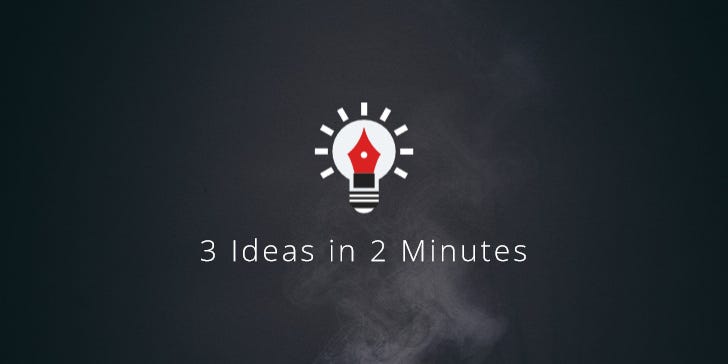#172: Learning to Be Silent, Dynamic Silence & Organisational Silence
3 Ideas in 2 Minutes on the Power of Silence
I. Learning to Be Silent
Silence is a skill that has to be learned. This is wittily illustrated with the following Zen story taken from Zen Flesh, Zen Bones by Paul Reps.
The pupils of the Tendai school used to study meditation before Zen entered Japan. Four of them who were intimate friends promised one another to observe seven days of silence.
On the first day all were silent. Their meditation had begun auspiciously, but when night came and the oil lamps were growing dim one of the pupils could not help exclaiming to a servant: “Fix those lamps.”
The second pupil was surprised to hear the first one talk. “We are not supposed to say a word,” he remarked.
“You two are stupid. Why did you talk?” asked the third.
“I am the only one who has not talked,” concluded the fourth pupil.
👉 This story is from my article 5 Zen Stories Worth Contemplating for Years (Or Not at All).
II. Dynamic Silence
Humans are hard-wired to talk. That makes the ability to keep quiet and listen a valuable skill in negotiations. Dynamic Silence is one of the Negotiation 9 (N9) skills proposed by negotiation expert Chris Voss.
Dynamic Silence is the process of using silence as a tool to give your counterpart the opportunity to respond to the other N9 skill you just used.
Silence is awkward. If you count one-one-thousand, two-one-thousand, three-one-thousand in your head, the other side will say something until you get to 10.
—Chris Voss
Say you’re close to getting a huge discount on your gym membership by asking the calibrated question: How would you feel about giving us 30% off if the whole family joins?Endure the silence. Resist the urge to retract or relativise your request because you’re having second thoughts. Give your counterpart time to think and respond. Make the dynamic silence work for not against you.
III. Organisational Silence
Silence is not always desirable, though. Organisational Silence, as researched by Elizabeth Wolfe Morrison and Frances J. Milliken, can have unintended negative consequences.
In Organizational Silence: A Barrier to Change and Development in a Pluralistic World, they claim that organisational silence arises from employees' fear of negative repercussions and distrust in leadership, believing that voicing concerns will not lead to change. This silence is not just an individual issue but is shaped by a broader organisational culture where power dynamics discourage open communication. The consequences are stagnation, unresolved problems and poor decision-making.
The concept is also eerily similar to the ideas of self-deception and motivated misperception. Then again, point out a few elephants in the room and you’ll understand why people prefer to keep their mouths shut. 🐘
Have a great week,
Chris
themindcollection.com


